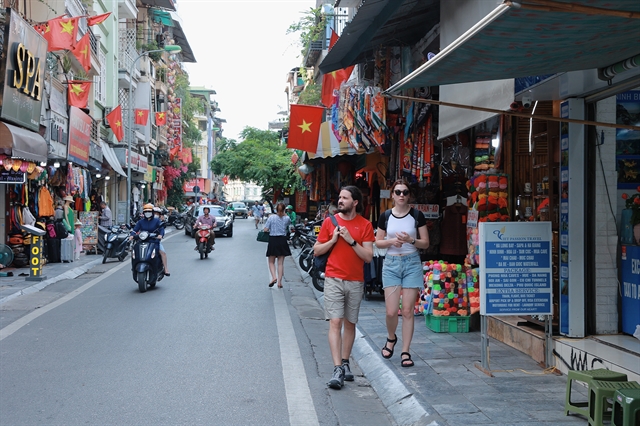Hà Nội, like many tourist hotspots, has its share of shady characters determined to capitalise on the naivety of unsuspecting visitors. Whether it's a rigged taxi meter or an overpriced meal, tourists are easy targets.
Seán Nolan
When I started my first job at 16, the store manager told me something that has always stuck with me.
"An unhappy customer will always tell more people about their experience than a happy one."
Although rising steadily, the number of visitors visiting Việt Nam is still well below pre-pandemic levels.
A friend of mine, who shall remain nameless for his pride's sake, is one of those who returned to Việt Nam last week for the first time since before COVID.

CAPITAL GAINS: Tourists in downtown Hà Nội. VNS Photo Trương Vị
A single man, he logged on to the dating app Tinder on arrival and was soon chatting to a young woman. She invited him to a bar that night and, with a little swagger in his step, off he went.
At the bar, he had a drink with his date, but no sooner had she finished her glass did she make her excuses and leave. No harm there, right? Wounded pride, but no more.
However, when my friend called the bill, it wasn't just his pride but his wallet that took a whipping. The total topped VNĐ4 million for the two drinks, and a few unsavoury characters hanging around the door ensured the bill was paid.
Now, it is easy to chuckle at the situation (and rest assured, when I heard the story first-hand, I laughed until my cheeks hurt, especially when he revealed that he decided to use his twin brother's debit card to settle the bill). However, it does highlight a broader issue; tourists falling victim to scams.
Hà Nội, like many tourist hotspots, has its share of shady characters determined to capitalise on the naivety of unsuspecting visitors. Whether it's a rigged taxi meter or an overpriced meal, tourists are easy targets.
To combat such misadventures, both local authorities and the tourism industry must take proactive measures. It's all well and good visas for tourism, but if Việt Nam's reputation as a tourism attraction is damaged, it may all be for nought.
Now, that being said, and particularly in my friend's case, the is also an onus on tourists to employ a healthy dose of scepticism and to arm themselves against some of the most common scams (like a girl from a dating app asking you to a bar that a quick Google search shows is notorious for this type of ruse).
However, allowing this kind of carry-on to continue, particularly as the number of visitors to Việt Nam continues to rise, may just prove my old boss right, and the minority of those who had a bad experience in Việt Nam will drown out the majority, regardless of who is to blame. VNS